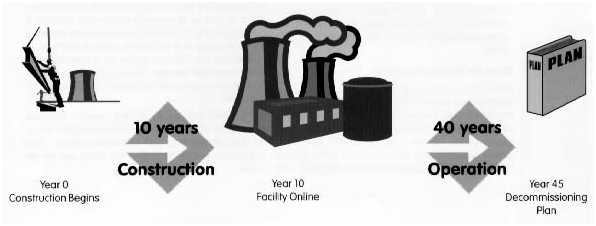Part Two of Two Parts (Please read Part One first.)
Money was collected from ratepayers who used nuclear power for the purpose of eventually dismantling old reactors, removing radioactive components and materials and restoring the land where the reactors had been located. That money was never intended to be used to pay for the indefinite storage of spent nuclear fuel rods on the site of the reactors but that is what is happening as the decommissioning funds are being raided.
Critics of temporary onsite spent fuel storage point out that while nuclear power plants are located near bodies of water that is use for cooling the reactors, spent nuclear fuel is best stored as far away from bodies of water as possible to prevent possible contamination in case that storage containers leak. Storing spent fuel in stable underground repositories is best.
Because of the failure of the U.S. government to complete the promised underground repository at Yucca Mountain as mentioned above, nuclear plant owners have resorted to redesigning the racks in cooling pools to accommodate more rods. It has been estimated that all the cooling pools for spent nuclear fuel in the U.S. will be full within five years unless some of the rods are removed.
The only choice for external storage without a permanent repository is to construct concrete and steel dry casks on site or at a central interim facility to contain the spent fuel. There are nuclear plant locations where the plant was decommissioned and removed decades ago but dry casks with spent fuel rods still remain and are guarded twenty four hours a day, seven days a week, three hundred and sixty five days a year. Some plants have been mothballed for up to sixty years in the hopes that there will be money available for decommissioning by then.
Vermont is the only state in the U.S. which is trying to prevent the raiding of decommissioning funds to build dry casks for temporary storage of spent fuel. Just recently, Vermont received a ruling from a NRC board that Entergy, the company that operates a nuclear power plant in Vermont, will have to notify the state government of any withdrawals from the decommissioning fund and exactly what the money is used for.
The nuclear industry is adamant that the blame for the raiding of decommissioning funds should not be placed on the industry, the NRC or even the Department of Energy. They say that the U.S. Congress is responsible for the current situation because it has failed to create the promised permanent underground repository. This is an interesting situation because the nuclear industry has "captured" the NRC and gets away with a lot of violations of regulations. They have spent millions in lobbying Congress but have not succeeded in get Congress to move forward swiftly in the creation of a permanent repository. The reason that they have failed is that there is great fear among the public of radioactive waste and for good reason.
The industry and the U.S. government have a horrible record of dealing with radioactive waste. Local political pressure has made it difficult for the U.S. government to find a site willing to host a permanent spent nuclear fuel repository. And every story about nuclear accidents makes the public more reluctant. Alternative sustainable energy should replace nuclear power as quickly as possible. We cannot even properly dispose of the spent nuclear fuel rods that exist. We should not be make and use more.
